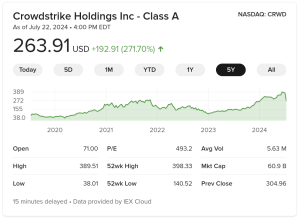![Generational Wealth and Business Exit Planning When should a founder sell his business, and to whom? Der Vater erstellt’s, der Sohn erhält’s, dem Enkel zerfällt’s. Coventry League's blogentary about generational wealth and business exit planning. [A Porsche image in background.]](https://coventryleague.com/wp-content/uploads/2020/07/wealth-generation-business-exit-planning-1024x536.jpg)
When should a founding entrepreneur sell his company? In other words, how should he prepare for the transference of generational wealth and business exit planning? Coventry League doesn’t have an absolute, concrete answer such as, “How soon is now?” Or, “Sell your business now and put 80% of the proceeds in physical gold.”1After taking into account business survivorship bias, physical gold is clearly superior for wealth preservation.
What we can state absolutely is that there’s a universal principle and understanding of what happens more often than not to generational wealth and the prosperity of businesses after a founding entrepreneur (first generation) transfers or sells his company to the second generation, and the second generation to the third, and so on and so forth.
Contents
Principles of Generational Wealth
We came across this quote by the first Chancellor of the German Empire, Otto von Bismarck:2In office from 1871 to 1890.
“Die erste Generation verdient das Geld, die zweite verwaltet das Vermögen, die dritte studiert Kunstgeschichte und die vierte verkommt vollends.”
~Otto von Bismarck
Here is the English translation:
“The first generation earns the money, the second manages the wealth, the third studies history of art, and the fourth degenerates completely.”
~Otto von Bismarck
Cycles of Wealth and Poverty
Likewise, similar sentiments can be found from most cultures and nations, and throughout time. For instance, in the brief blog article titled “The Cycle of Wealth and Poverty,” the author shares similar sayings from various cultures and nations including the Irish, French, Dutch, Germans, Swedes, Portuguese; China, India, Korea, United Arab Emirates. Here is a snippet from the article:
The Irish recognize the decline but also add something more to it: “The first generation is poor, the second is poorer, and the third gets robbed by the British.” Getting robbed by the British is what the Irish have in common with Indians (and a few dozen other nations).
For India, I think it would be “The first generation is rich, then the thieving British makes the second generation poor, and then the Indian Congress leaders who inherit the British raj leave the third generation destitute.”
The Americans put it tersely, “Blue collar to blue collar in three generations.” The Germans appear to agree with the Americans. “Der Vater erstellt’s, der Sohn erhält’s, dem Enkel zerfällt’s.”: “The father creates it, the son receives it, the grandson ruins it.”
“The Cycle of Wealth and Poverty” by deeshaa.org
Examples of Generational Wealth in the Auto Industry
If you’ve lived and breathed—or have analyzed the prosperity of businesses—long enough, then you will recognize the “Cycle of Wealth and Poverty” principle, which clearly provides guidance to generational wealth and business exit planning. Of course, there are exceptions, like with most rules of thumb.
For example, the Ford Motor Company has done quite well despite various descendants of founder Henry Ford controlling and even leading the company from time-to-time as CEO and chairman. Wise founders and second generation owner-operators, however, tend to follow the paths blazed by Honda and Porsche.3Note: our header image has a Porsche in the background.
Regarding the latter, Ferry Porsche, the son of Porsche’s founder, heeded the wisdom of Soichiro Honda‘s “no family members in the company” policy at Honda. As such, Ferry went on to establish an independent executive board and operating leadership, with most of Porsche’s family members exiting the company.
Closing Words
All this being said, Coventry League not only likes working with founders/first generation owners, but also embraces working with those “exceptions to the rule” – the talented and high-integrity second, third, and fourth generation business owners.4 Admittedly, it’s a short list.
Nevertheless, we are still mindful of the concept of “impermanence”– Greece → panta rhei (everything flows) | India → anicca (not constant)5 Anicca is intimately associated with the doctrine of anatta, according to which things have no essence, permanent self, or unchanging soul. – as the aforementioned blog author references in his article.
Or, as the poet Robert Frost wrote, “Nothing Gold Can Stay:”
Nature’s first green is gold, Her hardest hue to hold. Her early leaf’s a flower; But only so an hour. Then leaf subsides to leaf. So Eden sank to grief, So dawn goes down to day. Nothing gold can stay.

